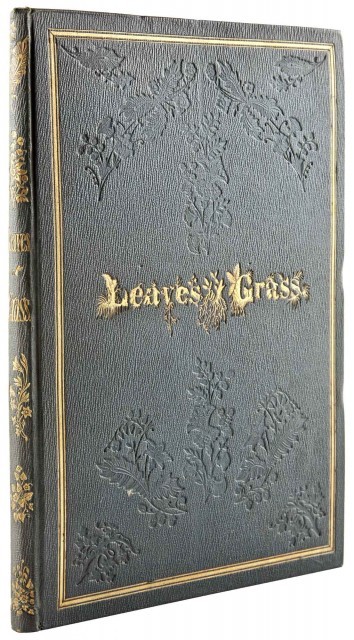Walt Whitman's Leaves of Grass: The Beginning of a Great Career
09/25/2020 Books & Autographs

NEW YORK, NY -- The Library of Duncan Cranford, a highlight section of the September 30 Fine Literature auction, features many important works of the 19th century, including an exceedingly fine copy of the first edition of Walt Whitman’s Leaves of Grass. Considered the greatest contribution to American poetry, the towering importance of the Leaves of Grass can not be overstated and it is has been described as “America’s second Declaration of Independence.” Beyond the text, the book is an exquisite object, hand printed and bound in Brooklyn, New York in 1855 in a large, legal sized format. Whitman, a trained newspaper printer, designed the binding, set type and contributed to the hand-printing of the book, playing a most tangible role in the realization of his opus.
Whitman envisioned Leaves of Grass as a collection of 12 poems, none named, suggesting a common thread between them, and also did not print his own name on the title page, suggesting that the poems belonged to all. Whitman did include a portrait frontispiece though depicting himself at 37, exuding confidence and swagger. Critics described him as a loafer with a slanted hat and without suspenders, his stance sensual and repulsive. Others praised the portrait for depicting the everyman of the poem, the carpenter, builder, mason, and mechanic. Whitman himself celebrated it as “natural, honest, easy: as spontaneous as you are, as I am, this instant, as we talk together.” After publication, Whitman continually added poems to Leaves of Grass and the work reached 400 poems by the time of his death. He also added compelling titles that have cemented the works in the poetry canon such as Song of Myself, I Sing the Body Electric and after the Civil War, Oh Captain! My Captain!
As mentioned, the first edition of Leaves of Grass is an important historical artifact for how it was physically made. Whitman found no willing publisher for this unusual group of poems and undertook to self-publish convincing a Brooklyn printer of legal documents to print it on off hours. Whitman designed the text and binding and assisted the printers in setting the type, a skill learned in his newspaper days. No 19th century poet played as important a role in the printing of their most important work. In all 795 copies of the first edition of Leaves of Grass were printed.
The present example is one of a small group of copies especially prepared by Whitman to be sent to England and bears the label of a London book seller on the title. The present volume further includes five promotional reviews all written by Whitman himself except one, a copy of a letter to him from fellow poet Ralph Waldo Emerson, who upon reading Leaves of Grass, wrote much to Whitman's delight, "I greet you at the beginning of a great career.” Today only seven other copies prepared by Whitman to be sent to London are known.
Of special note within this copy is an uncommon misprint on page 4 of the preface, in which the word “and” is misspelled “adn." It is known that Whitman read proof as the sheets came off the press and that this particular misprint was caught early and is now reported in fewer than 20 copies. Thus the opening sheets of the present copy are from the first batch off the press. It is exciting to consider what those first hours in the print shop were like for Whitman as the first sheets rolled off the press and his beautiful vision for this book was finally actualized.
After publication, the present copy has a distinguished provenance. The earliest bookplate, discreetly placed on the rear pastedown, is that of Henry Reeve, editor of the Edinburgh Review. Later the book was acquired by another important collector, Sir Herbert Leon, whose bookplate is found below Whitman's inserts. Finally, the book was acquired in 1938 by collector Duncan Cranford. The volume graced his shelves among other 19th and early 20th literature until his death in 1985. Cranford has penciled and signed a short note to the verso of the front free endpaper and the book has descended in his family. It is now offered for auction for the first time in 60 years.
In all, given the importance of the poem and rarity of the book, it’s fine state of preservation without restoration, and it’s notable provenance, this is a very desirable copy of the first edition of Walt Whitman’s Leaves of Grass.
Fine Literature
The timed auction of Fine Literature ending on September 30 is highlighted by a rare 1855 Brooklyn printed first edition of Leaves of Grass.